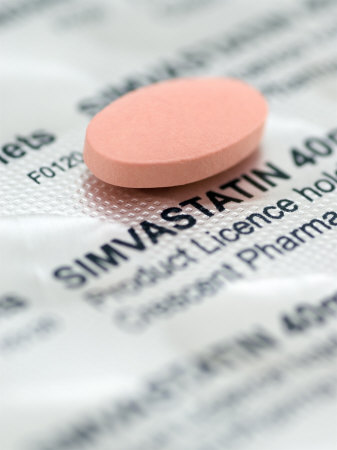
Aspirin and simvastatin, which have been shown to be beneficial in the treatment of cardiovascular disease, are ineffective at improving functional capacity in patients with pulmonary arterial hypertension (PAH), according to a multicenter study, sponsored by the National Institutes of Health (NIH), presented here at the American Thoracic Society 2011 International Conference.
The study was also published in the May issue of the American Journal of Respiratory and Critical Care Medicine.
In addition to their well-known role in cardiovascular disease, aspirin and simvastatin have demonstrated promising results for symptom relief in PAH, according to lead author Steven Kawut, MD, MS, associate professor of medicine and epidemiology at the University of Pennsylvania School of Medicine in Philadelphia.
"There was a lot of evidence, both from animal models and the human disease of PAH, that inhibiting platelet activation and thromboxane production with aspirin and the endothelial effects of simvastatin would result in benefit in PAH," Dr. Kawut explained.
He noted that each of the drugs' mechanisms were believed to independently improve PAH.
"PAH is characterized by endothelial dysfunction, like many other cardiovascular diseases," he noted. "While simvastatin lowers cholesterol, it is thought to have other beneficial clinical effects . . . through its pleiotropic actions."
"PAH also demonstrates increased platelet activation and increased levels of thromboxane. By inhibiting both, aspirin is thought to have beneficial effects," he added.
In an effort to explore the issue further, Dr. Kawut and his colleagues conducted a double-blind placebo-controlled clinical trial in which patients with PAH were randomized at 4 centers to receive aspirin 81 mg or a matching placebo, or simvastatin 40 mg or a matching placebo.
The primary outcome was 6-minute walk distance (6MWD) after 6 months. The researchers planned to enroll 92 patients in the study; however, the trial was terminated by the Data and Safety Monitoring Board at just 65 patients after an interim analysis showed a significant reduction in 6MWD among those receiving simvastatin.
There was no difference in 6MWD between the 32 patients receiving aspirin and the 33 patients receiving placebo (placebo-corrected difference = –0.5 m; P =.97) or between the 32 patients receiving simvastatin and the 33 patients receiving placebo (with a placebo-corrected difference, –27.6 m; P =.09).
Patients in the aspirin group had more episodes of major bleeding than those in the placebo group (4 vs 1 events; P =.17).
The study is the first NIH-funded randomized clinical trial of PAH. Despite the negative results, it provides a valuable answer to the question clinicians have long asked, said Brett Fenster, MD, a cardiologist from National Jewish Health Center, in Denver, Colorado.
"This study addresses an important question that we've been thinking about for some time, which is — particularly with the statin arm: What can a statin do for pulmonary hypertension?," Dr. Fenster said.
"There's been a lot of anecdotal evidence that it may do some good things, with the idea being that what happens in the pulmonary arteries with PAH in some ways resembles what happens to the coronary arteries or other arteries with atherosclerosis."
Although the results showed no improvement in functional capacity, Dr. Fenster said the drugs should still not be ruled out as possibly offering benefit for mortality in PAH.
"The fact that it's negative in terms of a 6-month look at functional capacity doesn't surprise me too much. I think the bigger question in the longer term is whether there is any change in mortality."
In pulmonary hypertension in general, there appears to be a disconnect between therapies that improve functional capacity and those that improve mortality, with drugs like sildenafil (Revatio, Pfizer) showing improvement in the 6MWD, but not in mortality, Dr. Fenster explained.
"This may go in the opposite direction, ultimately," he said, adding that the study should not be dismissed because of its small sample size.
"With a rare disease like PAH, a sample size of 92 patients is actually pretty good, so this is a decent-sized trial, and the data are compelling. But someone still should still look at the question of what it does for mortality. I think that is certainly a study worth doing."
The study was funded by National Institutes of Health grants R01 HL082895 and HL082895-S1. Dr. Kawut and Dr. Fenster have disclosed no relevant financial relationships.
American Thoracic Society (ATS) 2011 International Conference: Abstract 16864. Presented May 18, 2011.
Am J Respir Crit Care Med. 2011;183:A6126.
根據發表於美國胸腔協會2011年國際研討會、國家健康研究中心(NIH)贊助的一篇多中心研究,有助於治療心血管疾病的阿斯匹靈和simvastatin,對於肺動脈高壓(PAH)患者的功能改善無效。
這篇研究也登載於5月的美國呼吸道與重症醫學期刊(American Journal of Respiratory and Critical Care Medicine)。
根據第一作者、費城賓州大學醫學院醫學與流行病學副教授Steven Kawut醫師表示,阿斯匹靈和simvastatin除了已知用於心血管疾病的作用之外,看來對於緩解肺動脈高壓症狀也有效用。
Kawut醫師解釋,有關肺動脈高壓的動物實驗和人類研究有許多證據指出,使用阿斯匹靈抑制血小板活化和產生促血栓素,利用simvastatin的內皮效果,而對肺動脈高壓產生助益。
他指出,這兩個藥物各自的機轉都對改善肺動脈高壓有幫助。
肺動脈高壓的特徵是內皮功能障礙,如同其他諸多心血管疾病一樣;而simvastatin可降低膽固醇,透過它的多效作用,被視為有其他的臨床助益;此外,肺動脈高壓也會增加血小板作用和增加促血栓素數值,阿斯匹靈藉由抑制兩者而產生幫助。
為了進一步探討這個議題,Kawut醫師等人對肺動脈高壓病患進行了一個雙盲安慰劑控制試驗,在4個醫學中心內隨機指派接受阿斯匹靈81 mg或安慰劑,或指定使用simvastatin 40 mg或安慰劑。
初級結果是6個月後的6分鐘行走距離(6MWD),研究者計畫納入92名研究對象;不過,在納入65名病患時的期中分析顯示服用者的6MWD顯著降低之後,資料與安全監督委員會要求試驗中止。
服用阿斯匹靈的32名病患和服用安慰劑的33名病患,其6MWD並無差異(安慰劑校正差異= –0.5 m;P=.97),服用simvastatin的32名病患和服用安慰劑的33名病患之間也沒有差異(安慰劑校正差異= –27.6 m;P=.09)。
阿斯匹靈組的病患發生嚴重出血的事件比安慰劑組多(4件 vs 1件;P=.17)。
這篇研究是第一篇NIH資助的肺動脈高壓隨機臨床試驗,科羅拉多州丹佛國立猶太健康中心的心臟科醫師Brett Fenster表示,雖然是負面結果,這篇研究對於長久以來的問題提供了一個有價值的解答。
Fenster醫師表示,這篇研究為我們大家常在思考的「statin類藥物對於肺高壓的作用為何?」這個重要問題提出解釋。
有許多傳聞中的證據指出statin類藥物可能有幫助,這觀念是基於肺動脈高壓者的肺動脈狀況就像是粥狀動脈化者的冠狀動脈情形。
不過,結果顯示,statin類藥物未能改善功能性能力,Fenster醫師表示,應該仍無法排除此類藥物對於肺動脈高壓之死亡率方面的可能好處。
就6個月的功能性能力看來,確實是負面結果,但這不太令人驚訝,Fenster醫師認為更大的問題在於,就長遠來看是否可改善死亡率。
Fenster醫師解釋,就肺動脈高壓而言,一般會把改善功能性能力和改善死亡率分開,例如sildenafil (商品名Revatio,Pfizer藥廠)顯示可改善6MWD,但是對改善死亡率則沒有效果。
他表示,雖然最後可能事與願違,但不該因為這是篇小型研究就忽略。
因為肺動脈高壓是罕見的疾病,有92個病患的樣本數實際上已經相當好,因此這是個樣本數合宜的試驗,資料也令人信服,但是,仍有人執意探討此類藥品對死亡率的影響問題,而這也確實是值得進行的研究。
資料來源:http://www.24drs.com/professional/list/content.asp?x_idno=6535&x_classno=0&x_chkdelpoint=Y





 留言列表
留言列表
 線上藥物查詢
線上藥物查詢 